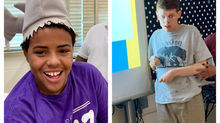Access to Communication
- Cade, Nathan, Srija | Lisa Mihalich Quinn
- Jul 24, 2019
- 3 min read

This July, students at Reach Every Voice Summer Institute spent a week learning about advocacy and collaborating to advocate for a cause that gets them fired up. Over the next few blogs, we will share students' advocacy projects with you. Please share away and help these voices be heard!
Today: Cade, Nathan, and Srija advocate for communication access and representation at IEP meetings.
Can you imagine never being able to speak in school? Well, I spent years of my life constantly aware that I could understand everything said but could not get my mouth to say it. Hearing learned crying for communication and finding habits that passed the day was how I made it through third grade. Fortunately in fourth grade I had a teacher who thought I could learn to type my thoughts. Until then my education consisted of money counting, symbol seeing, and complete chaos. When I actually had a way to communicate my thoughts, school changed. My teachers challenged me and the chaos subsided. Now I’m going into seventh grade and I can’t imagine how different my life would be if I did not have access to my simple keyboard and aide. My story has a good ending, but many buddies’ stories do not. Being denied access to their communication, sitting and wasting time in classes babies would find boring, and constantly feeling muzzled is their lot. I’m going to pass the mic to two of those students. Read their words and tell me why they deserve anything worse than a real education.
-Nathan
I am Srija. I am eighteen years old. At present time I do not have any mode of communication at school. Typing to communicate is my only hope, for kids like me as well. Everything needs practice, and we have seen kids in a pilot program have flourished. So I need an opportunity. Typing to communicate gives me hope, makes me feel powerful and calm. It will give me basic dignity in life.
I am Cade. I have been a student in MCPS for my whole life. Now that I have a new and reliable way to communicate, I would love to be able to use it to make decisions and participate in my education. At eighteen, I don’t need a room full of adults talking about me and my intelligence every year while I am panicking without a voice in the back of the room. Please allow me the opportunity to participate as more than a silent, flapping audience member.
According to US Code § 1414 (Evaluations, eligibility determinations, individualized education programs, and educational placements), I should legally be an active part of my IEP meetings. According to the Code, an “IEP Team” should consist of who we (the student) want. Who we want includes us. So, we want to be there, not just in person but in voice, too. Being a part of those IEP meetings “whenever appropriate” means always when it comes to me and my friends with ASD who have a reliable method of communication.
By allowing us to have access to communication, we will have the ability to prove how smart we really are. This will make a world of difference in how we behave at school, as Nathan shared in his opening paragraph. Voices are different all throughout the school system, so why are we being denied access to ours? We type to communicate with the support of trained CPs (communication partners). At the very least, we would like to have autonomy in our IEP meetings. At ages 18 and 14, our maturity is great enough that we should have a say in how and what we are doing at school. Our potential to be career ready is zero if we remain in the programs we’re in now without access to a voice.
It should be readily apparent by now that we three students are equally deserving of both a meaningful education and access to reliable communication. The constitution guarantees a right to free speech. The denial of the students’ method of communication violates their civil rights. Moreover, this oppression of a marginalized community brings the question of human rights to the forefront. We, at the very least, should have a voice in the decision making processes that affect our entire educational lives. Please give us a choice to participate in our own lives.
Cade is an 18-year-old autistic kid who found his voice on the letterboard.
Nathan is impolitely going to rock your world about the brains of us autists.
Srija is an eighteen-year-old girl who is new to REV and is feeling empowered to communicate among peers.




















.png)




.png)

